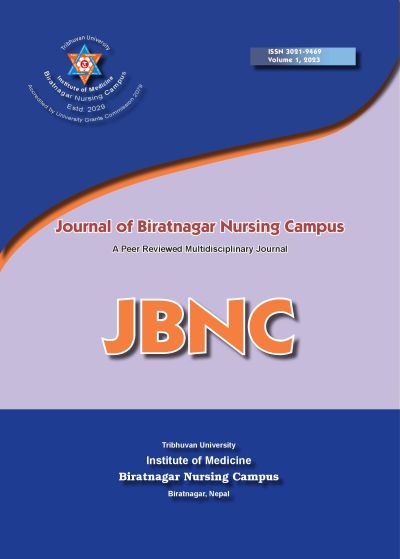Parental Feeding Practices among Young Children of Selected Wards of Biratnagar Metropolitan City
DOI:
https://doi.org/10.3126/jbnc.v1i1.63247Keywords:
ISS, Parent, Parental feeding practice, Young childrenAbstract
Introduction: Traditionally, parenting style has been defined as a classification of attitudes and behaviors that distinguish the way that parents interact with their children across various domains of parenting. The eating behavior of children is not only influenced by feeding practices but also by their food preferences and weight, sooner or later. The objective of the study was to assess the parental feeding practices among young children.
Methods: A descriptive cross-sectional study was conducted in selected wards of Biratnagar Metropolitan city from 30th December 2018 to 25th January 2019. A total of 96 parents meeting the eligibility criteria were purposively selected. A validated standard ISS tool was used to assess the feeding practices. Student T-test and One-way ANOVA test were used to find out the association between the outcome variable with selected demographic variables.
Result: Restriction was the most frequently used feeding practice (20.17±3.330) by parents followed by rewarding (11.92±2.582). Restriction was significantly associated with ethnicity (0.010) while rewarding was not significantly associated with any socio-demographic variables. Higher mean restriction scores were found in children who were at risk of being overweight (21.20±3.011). Modeling was significantly associated (0.029) with the body mass index of the child.
Conclusion: The study concluded that most of the parents used restriction while feeding. Ethnicity was statistically significant with the use of restriction (p=0.010) and monitoring whereas use of pressure was statistically significant with primary care giver and religion.
Downloads
Downloads
Published
How to Cite
Issue
Section
License
Copyright (c) 2023 Biratnagar Nursing Campus

This work is licensed under a Creative Commons Attribution 4.0 International License.
This license enables reusers to distribute, remix, adapt, and build upon the material in any medium or format, so long as attribution is given to the creator. The license allows for commercial use. If you remix, adapt, or build upon the material, you must license the modified material under identical terms.




